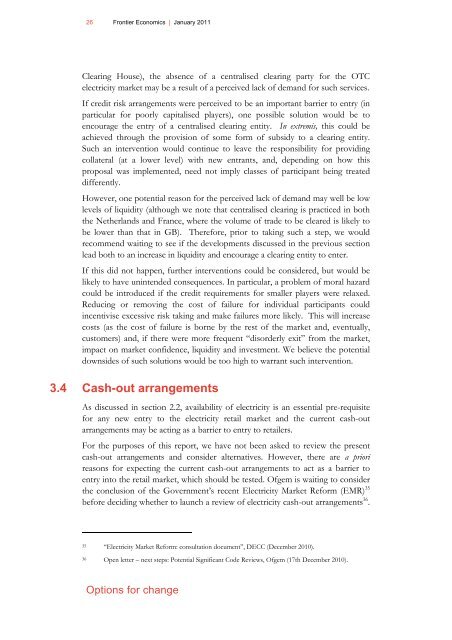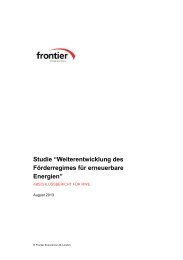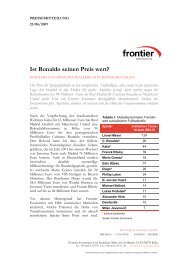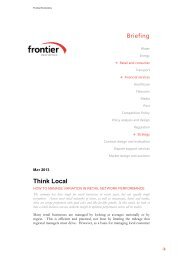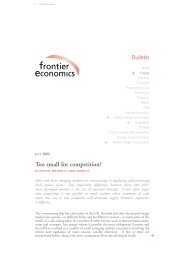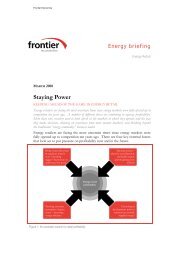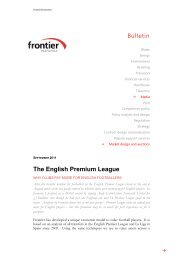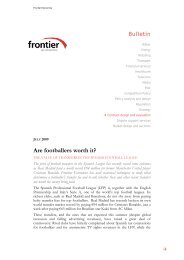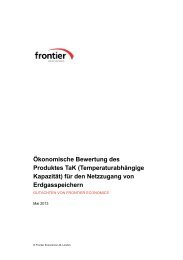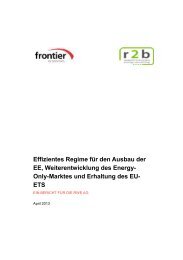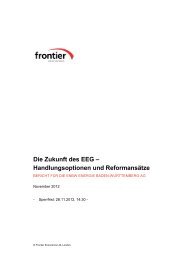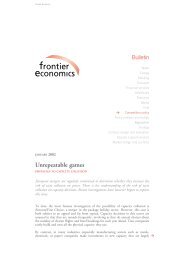competition and entry in the gb electricity retail market.pdf - Frontier ...
competition and entry in the gb electricity retail market.pdf - Frontier ...
competition and entry in the gb electricity retail market.pdf - Frontier ...
You also want an ePaper? Increase the reach of your titles
YUMPU automatically turns print PDFs into web optimized ePapers that Google loves.
26 <strong>Frontier</strong> Economics | January 2011<br />
Clear<strong>in</strong>g House), <strong>the</strong> absence of a centralised clear<strong>in</strong>g party for <strong>the</strong> OTC<br />
<strong>electricity</strong> <strong>market</strong> may be a result of a perceived lack of dem<strong>and</strong> for such services.<br />
If credit risk arrangements were perceived to be an important barrier to <strong>entry</strong> (<strong>in</strong><br />
particular for poorly capitalised players), one possible solution would be to<br />
encourage <strong>the</strong> <strong>entry</strong> of a centralised clear<strong>in</strong>g entity. In extremis, this could be<br />
achieved through <strong>the</strong> provision of some form of subsidy to a clear<strong>in</strong>g entity.<br />
Such an <strong>in</strong>tervention would cont<strong>in</strong>ue to leave <strong>the</strong> responsibility for provid<strong>in</strong>g<br />
collateral (at a lower level) with new entrants, <strong>and</strong>, depend<strong>in</strong>g on how this<br />
proposal was implemented, need not imply classes of participant be<strong>in</strong>g treated<br />
differently.<br />
However, one potential reason for <strong>the</strong> perceived lack of dem<strong>and</strong> may well be low<br />
levels of liquidity (although we note that centralised clear<strong>in</strong>g is practiced <strong>in</strong> both<br />
<strong>the</strong> Ne<strong>the</strong>rl<strong>and</strong>s <strong>and</strong> France, where <strong>the</strong> volume of trade to be cleared is likely to<br />
be lower than that <strong>in</strong> GB). Therefore, prior to tak<strong>in</strong>g such a step, we would<br />
recommend wait<strong>in</strong>g to see if <strong>the</strong> developments discussed <strong>in</strong> <strong>the</strong> previous section<br />
lead both to an <strong>in</strong>crease <strong>in</strong> liquidity <strong>and</strong> encourage a clear<strong>in</strong>g entity to enter.<br />
If this did not happen, fur<strong>the</strong>r <strong>in</strong>terventions could be considered, but would be<br />
likely to have un<strong>in</strong>tended consequences. In particular, a problem of moral hazard<br />
could be <strong>in</strong>troduced if <strong>the</strong> credit requirements for smaller players were relaxed.<br />
Reduc<strong>in</strong>g or remov<strong>in</strong>g <strong>the</strong> cost of failure for <strong>in</strong>dividual participants could<br />
<strong>in</strong>centivise excessive risk tak<strong>in</strong>g <strong>and</strong> make failures more likely. This will <strong>in</strong>crease<br />
costs (as <strong>the</strong> cost of failure is borne by <strong>the</strong> rest of <strong>the</strong> <strong>market</strong> <strong>and</strong>, eventually,<br />
customers) <strong>and</strong>, if <strong>the</strong>re were more frequent “disorderly exit” from <strong>the</strong> <strong>market</strong>,<br />
impact on <strong>market</strong> confidence, liquidity <strong>and</strong> <strong>in</strong>vestment. We believe <strong>the</strong> potential<br />
downsides of such solutions would be too high to warrant such <strong>in</strong>tervention.<br />
3.4 Cash-out arrangements<br />
As discussed <strong>in</strong> section 2.2, availability of <strong>electricity</strong> is an essential pre-requisite<br />
for any new <strong>entry</strong> to <strong>the</strong> <strong>electricity</strong> <strong>retail</strong> <strong>market</strong> <strong>and</strong> <strong>the</strong> current cash-out<br />
arrangements may be act<strong>in</strong>g as a barrier to <strong>entry</strong> to <strong>retail</strong>ers.<br />
For <strong>the</strong> purposes of this report, we have not been asked to review <strong>the</strong> present<br />
cash-out arrangements <strong>and</strong> consider alternatives. However, <strong>the</strong>re are a priori<br />
reasons for expect<strong>in</strong>g <strong>the</strong> current cash-out arrangements to act as a barrier to<br />
<strong>entry</strong> <strong>in</strong>to <strong>the</strong> <strong>retail</strong> <strong>market</strong>, which should be tested. Ofgem is wait<strong>in</strong>g to consider<br />
<strong>the</strong> conclusion of <strong>the</strong> Government’s recent Electricity Market Reform (EMR) 35<br />
before decid<strong>in</strong>g whe<strong>the</strong>r to launch a review of <strong>electricity</strong> cash-out arrangements 36 .<br />
35 “Electricity Market Reform: consultation document”, DECC (December 2010).<br />
36 Open letter – next steps: Potential Significant Code Reviews, Ofgem (17th December 2010).<br />
Options for change


